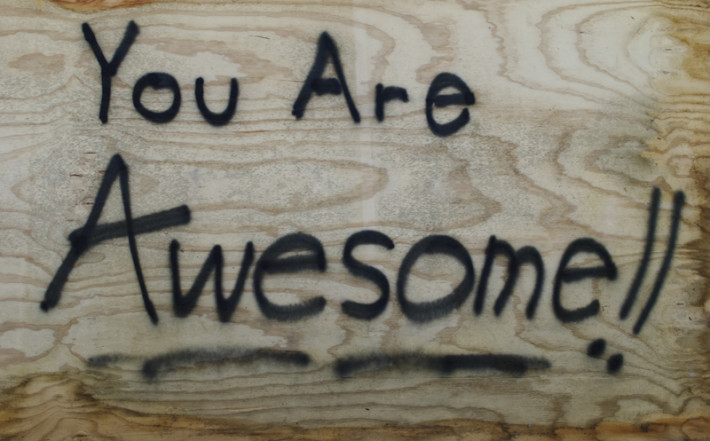Want to boost your self-esteem? Find a mentor and be a mentor

How we see ourselves is important. People who have higher self-esteem tend to be happier, and people with lower self-esteem tend to be more depressed. And yet simply telling someone they are awesome is not effective. If it was, then you would be able to boost your self-esteem simply by scrolling Facebook’s positive messages over pictures of sunsets.
So how do you lift your self-esteem? And will lifting our self-esteem really help our quality of life, or is there something else we should be considering?
These questions were on my mind when I recently encountered some construction at my local train station.
Messages we hear

I arrived at my train station the other day to find plywood walls erected in the back of the entry area. On the walls were big signs telling me to keep out, wear my personal protective equipment, and advertising the name of the company responsible for the construction. This had the effect of making me feel slightly unsafe and knowing who I should call if I ever wanted plywood walls erected in my home. On closer inspection, I saw a smaller sign advising that we could expect a “new railway squad outpost”, that it would be finished mid-2014, and that my patience was appreciated.
As I considered the messages my train company chose to show me, I asked: What else could be done with this space? After all, public spaces are pretty important to develop local culture, determine how people are included or excluded in their community, and address our growing feelings of seperatedness. If I were a train company with a temporary blank wall in a public space, was there some message I could send that would make a fundamental difference in people’s lives? Would simply telling people they were awesome change how they see themselves?
Research shows that it depends. To understand what can impact how we see ourselves, it helps to know about the unhealthy flavours of self-esteem.
Unhealthy flavours of self-esteem

Your self-esteem determines the extent that you “consider yourself adequate—a person of worth“. Based on this definition, you would think that high self-esteem would be a good thing. True, self-esteem is proven to result in enhanced initiative and pleasant feelings. However, it is also shown to lead to riskier behaviour such as unprotected sex or drug experimentation in adolescents, greater prejudice and discrimination in leaders, is not a predictor of long-term relationships, and boosting self-esteem alone has not proven to impact academic or job performance.
While people who are deemed as successful may have high self-esteem, having high self-esteem will not necessarily make you successful. The outcome depends on your version of self-esteem, as there are two flavours that are decidedly unhealthy.
Flavour 1: Narcissism
The first unhealthy flavour of self-esteem relates to narcissism, or a belief that a person is better than others. This flavour is often combined with an inaccurate self-perception of the person’s own abilities. Those whose self-esteem is based on a comparison to others are more likely to push those close to them away by out-performing them if those people pose a threat to their self-esteem.
Flavour 2: Contingent
The second unhealthy self-esteem flavour is known as performance based self-esteem or contingent self-esteem. In this version, a person’s self-worth is linked to success or failure in different domains of life such as family, school, work, or religion. In a study of over 4,300 participants, performance-based self-esteem was strongly linked to burnout and stress due to the continual energy needed to maintain a positive self-image through status, tasks or approval. The connection to burnout was also found to be more prevalent in women than men, perhaps due to a need to compensate for general inequalities in the workforce.
Another term used for this second version of self-esteem is organisational-based self-esteem. This refers to people who get their self-esteem from the organisations in which they participate, such as work or other community group. One research article noted that this self-esteem can be considered as either “fragile” or “secure”.
When our self-esteem is fragile, then perceived threats can result in highly defensive behaviour. This is an important point, in that simply increasing organisational-based self-esteem can lead to narcissistic and defensive behaviours if the organisation is the only source of self-esteem for the people involved. Simply increasing brand loyalty with insecure people can be counter-productive.
Three costs of an unhealthy self-esteem diet
Like eating too much of a bad thing, a steady diet of these unhealthy forms of self-esteem can have negative impacts. In her article that explored our “Insatiable quest for self-worth”, Dr. Jennifer Crocker, who has invested significant time in researching self-esteem, notes that:
“Self-esteem is optimal when we are not pursuing it, not trying to get it, protect it, or increase it. Self-esteem is a means, not an end. There may be some minimum level of self-esteem that is required to have enough confidence in ourselves to achieve our goals, to believe that we have enough chance to make them happen. Beyond that minimum, increasing the level of self-esteem people have does not seem to increase the chances that they will achieve their goals.”
Crocker goes on to note three other costs of pursuing self-esteem as an end in itself:
Cost 1. Impacts to learning
When our goal is self-esteem, we are focused what we are now, not what we need to become. Because we want to feel worthy, we are not realistic about our strengths and weaknesses, where we need to improve, what we have accomplished, and what we still need to accomplish; instead, we cling to positive illusions about the self. We spend so much energy maintaining our image that we miss opportunities to learn new things, perceiving feedback as threats.”
Cost 2. Ability to form relationships
“In seeking self-esteem, we not only need to be competent, right, or good, but we also need to be more competent than others, right over them, or better than they are… to be admired by others, yet they become a danger to us. People engaged in the pursuit of self-esteem respond to self-threats with avoidance, distancing, and withdrawal, or with blame, excuses, anger, antagonism, and aggression; all taking a toll on relationships with others.”
Cost 3. Stop us from achieving our goals
“When our actions have the higher order goal of maintaining, protecting, or enhancing self-esteem, we are quickly and easily diverted from the subordinate goal into goals concerning our own self-esteem.”
How we learn our dietary habits: Sources of self-esteem
Similar to the propensity of poor diets, low self-esteem is not surprising in our society. The marketing-driven commercial machine actually benefits from consumers maintaining a low self-image. Our purchasing decisions are based on our need to reinforce our various identities, such as a caring father, a responsible woman, or a hip teenager.
Our self-worth drives behaviour to defend our notion of our self, or our resiliency. Low self-worth means we are less likely to act in a way that defends our identity.
Take for example men’s deodorant Old Spice that says “The man your man could smell like,” or women’s deodorant Degree that is needed because “strong women sweat“. These messages present an implicit or explicit threat to our identity (eg., we are less of a man or a woman). Research has shown that those who define their self-worth from those around them rather than define it for themselves and who have a lower self-worth are more likely to act in response to messages that threaten their self-worth.
Don’t feel bad if it feels difficult to change how you see yourself. Self-esteem is a fairly stable trait, meaning high or low levels of self-esteem found in children will usually be at similar levels when those children become adults.
Self-esteem levels are also typically the same across families, with self-esteem levels in partners often being equal and self-esteem levels in parents reflected in their children. The primary contribution from parents to low self-esteem has been found to be a lack of care or indifference more so than aggressive or derogatory behaviour towards their children. Particularly in our forming years, we need to know that someone knows we are alive. Take for example girls in foster care who enter adulthood have been found to have lower self-esteem and a high rate of un-wed pregnancies, drug problems, homelessness, difficulty locating employment, and are less likely to pursue a higher education.
Mentoring to build self-esteem

Continuing the food analogy, eating more food will not make you healthy any more than simply telling yourself you are awesome will build the appropriate type of self-esteem. Just as people go to a doctor or dietitian to help with their physical diet, the solution to self-esteem appears to be a combination of building self-esteem from within and getting help from others.
Take for instance the previous example of at-risk youth. Studies have shown a direct correlation between the presence of mentors in the lives of young people and positive and secure levels of self-esteem. I see this played out in the not-for-profit program Vital Projex I am involved with, which has had significant success utilising chaplains to help young people develop values and build resiliency in their lives.
The same model plays out in the commercial world. Formal mentoring has proven to build self-esteem and result in improved success in protégés of new-business startup programs. This is supported by other studies showing people have greater self-worth when they are treated with kindness and respect.
Two strategies to build self-esteem: Goals bigger than you and mentoring
You have value, not because you are more important than anyone else or because of your accomplishments. You have value because you are a living, breathing individual with incredible potential. This understanding of your self-worth can be developed from within, and others can help in the process.
To achieve what she refers to as optimal self-esteem, Dr. Jennifer Crocker had this to say:
“To achieve optimal self-esteem, we simply need to identify a higher order goal in each situation, a goal that is about what we can create or contribute, that is larger than the self and consistent with core values, and choose it. Letting go of our goal to maintain, enhance, or protect out self-esteem requires that we become clear about our values and what we want to create or contribute to each situation, and it requires that we face our fears of being worthless, and act on another goal in spite of those fears.”
Based on upbringing, not everyone is equipped to do this. Mentors play a key role in helping people develop their goals and realise their full potential.
My journey through my train station had me wondering whose responsibility it was to develop people’s self-esteem if the individual does not have the capacity themselves. Simply spray painting messages does not appear to be the answer.
- Is it the government or those responsible for public spaces many of us frequent on a daily basis?
- Is it the school system where we spend our formative years?
- Is it the commercial sector where we spend so much of our lives?
Based on my research, my conclusion is that the responsibility is shared. First, we have a responsibility to ourselves to learn how to set our own goals that are bigger than ourselves and seek out those who can help us along the way. As part of this process and as people develop their self-esteem, I also feel it is everyone’s responsibility to give back and seek out those they can mentor in whatever small way to “be the change we want to see”.
If helping others is a way you feel you can give back and you are connected with someone who you feel could use this information about self-esteem, I welcome you to share this information through the social links below. If you would like to share about your own self-esteem diet, please feel free to add your feedback in the comments area.


This is great Chad! I really enjoyed your insights here. There is so much goodness in here I can’t quite take in all in. In keeping with your food analogy, I think I may need to let this one marinate a bit, check in on it after a little while and then get cooking!
Thank you for your thought provoking wisdom as always!
Stace
Thanks Stacey! Wisdom is often richer when you let it simmer a bit, and I am sure yours is well worthy of sharing. 🙂